 W
WConsort Ban, or Ban Jieyu, also known as Lady Ban (Pan), was a Chinese scholar and poet during the Western Han Dynasty. Jieyu (婕妤) was a title for a third-rank palace lady, one rank below the Zhaoyi and two ranks below the Empresss. Her personal name is not known.
 W
WXie Wanying, better known by her pen name Bing Xin or Xie Bingxin, was one of the most prolific Chinese women writers of the 20th century. Many of her works were written for young readers. She was the chairperson of the China Federation of Literary and Art Circles. Her pen name Bing Xin carries the meaning of a morally pure heart, and is taken from a line in a Tang Dynasty poem by Wang Changling.
 W
WCai Yan, courtesy name Wenji, was a poet and musician who lived during the late Eastern Han dynasty of China. She was the daughter of Cai Yong. Her courtesy name was originally Zhaoji, but was changed to Wenji during the Jin dynasty to avoid naming taboo because the Chinese character for zhao in her courtesy name is the same as that in the name of Sima Zhao, the father of the Jin dynasty's founding emperor, Sima Yan. She spent part of her life as a captive of the Xiongnu until 207, when the warlord Cao Cao, who controlled the Han central government in the final years of the Eastern Han dynasty, paid a heavy ransom to bring her back to Han territory.
 W
WChang Ch'ung-ho or Zhang Chonghe, also known by her married name Ch'ung-ho Chang Frankel, was a Chinese-American poet, calligrapher, educator and Kunqu opera singer. She is hailed as "the last talented woman of the Republic of China" (民國最後一位才女).
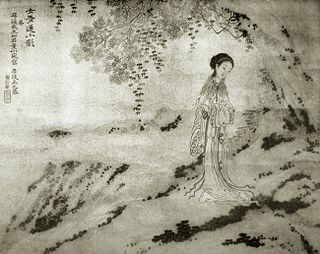 W
WDong Xiaowan (1624–1651) was a Chinese courtesan, poet and writer, also known by her pen name Qinglian.
 W
WDu Qiuniang or Lady Du Qiu (?–825?) was a Tang dynasty Chinese poet. She is the only female poet to be included in the famous anthology Three Hundred Tang Poems.
 W
WGu Taiqing was one of the top-ranked women poets of the Qing Dynasty. She is especially known for her ci poetry and for her sequel to the novel Honglou meng. One scholar estimates that there are as many as 1,163 surviving poems written by Gu.
 W
WHe Xiangning was a Chinese revolutionary, feminist, politician, painter, and poet. Together with her husband Liao Zhongkai, she was one of the earliest members of Sun Yat-sen's revolutionary movement Tongmenghui. As Minister for Women's Affairs in Sun's Nationalist government in Guangzhou (Canton), she advocated equal rights for women and organized China's first rally for International Women's Day in 1924. After her husband's assassination in 1925 and Chiang Kai-shek's persecution of the Communists in 1927, she stayed away from party politics for two decades, but actively worked to organize resistance against the Japanese invasion of China.
 W
WConsort Xu (徐惠妃) was a concubine of Later Shu's emperor Meng Chang during imperial China's Five Dynasties and Ten Kingdoms period. More commonly known as Madame Huarui (花蕊夫人), she was also a notable poet.
 W
WLi Qingzhao, pseudonym Householder of Yi'an (易安居士), was a Chinese poet and essayist during the Song dynasty. She is considered one of the greatest poets in Chinese history.
 W
WLi Xiangjun was a courtesan, singer, and musician during the Ming dynasty. Her life was dramatised in the play The Peach Blossom Fan.
 W
WLi Yin, also known by her courtesy name Jinsheng (今生) and her art names Shi'an (是庵) and Kanshan Nüshi, was a Chinese painter, poet, and calligrapher during the late Ming and early Qing dynasties, noted for her flowers and birds. Her artwork was sought after in her lifetime, resulting in as many as forty imitators in her area producing fakes of her works.
 W
WLin Huiyin was a Chinese architect and architectural historian. She is known to be the first female architect in modern China and her husband the famed "Father of Modern Chinese Architecture" Liang Sicheng, both of whom worked as founders and faculty in the newly formed Architecture Department of Northeastern University in 1928 and, after 1949, as professors in Tsinghua University in Beijing. Liang and Lin began restoration work on cultural heritage sites of China in the post-imperial Republican Era of China; a passion which she would pursue to the end of her life. The American artist Maya Lin is her niece. She is a poet, essayist, and Chinese first female architect, and married Liang Sicheng who was named "the father of Chinese architecture" in 1928. They have made great contributions to the development of Chinese architecture and the preservation of cultural relics. Liang and Lin both received their higher education abroad at the University of Pennsylvania. As a literary writer and architectural historian, Lin Huiyin rebuilt the capital from the aspects of cultural tradition, architectural beauty, historical significance, and living conditions of the people. Meanwhile, Lin Huiyin participated in the design of the "National emblem" and the "Monument to The People's Heroes".
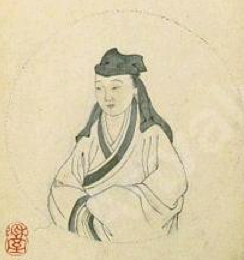 W
WLiu Rushi, also known as Yang Ai (杨爱), Liu Shi (柳是), Liu Yin (柳隐) and Yang Yin (杨隐),Yang Yinlian (杨影怜), Hedong Jun (河东君), was a Chinese notable courtesan and poet in the late Ming dynasty who married Qian Qianyi at the age of 25. Qian was an official and poet. She committed suicide after her husband died. She famously exchanged verses with Chen Zilong, and was noted for her painting.
 W
WLiu Xia is a Chinese painter, poet, and photographer. Liu Xia was under effective house arrest in China as her husband, Liu Xiaobo, had been awarded the Nobel Peace Prize in 2010. She remained under house arrest until 10 July 2018, when she was allowed to travel to Germany for medical treatment.
 W
WLü Bicheng was a Chinese writer, activist, newspaper editor, poet and school founder. She has been mentioned as one of the top four women in literature from the early Republic of China.
 W
WLu Ping, born in Kaohsiung in 1953, is a Taiwanese writer who writes under the pen name “Ping Lu”. Her writing encompasses a broad range of genres, including novels, essays, poems, commentary, and theater plays. She is also known in the Chinese-language world for her critique of social phenomenon, ranging from cultural development to gender issues and human rights. Over the past two decades, Ms. Lu has successfully established herself as a prominent novelist, columnist, and commentator in Taiwan.
 W
WSally Wen Mao is an American poet. She won a 2017 Pushcart Prize.
 W
WQiu Jin was a Chinese revolutionary, feminist, and writer. Her courtesy names are Xuanqing and Jingxiong. Her sobriquet name is Jianhu Nüxia which, when translated literally into English, means "Woman Knight of Mirror Lake". Qiu was executed after a failed uprising against the Qing dynasty, and she is considered a national heroine in China; a martyr of republicanism and feminism.
 W
WShangguan Wan'er was a concubine/imperial consort to two emperors of the Tang dynasty. Although caught up in court intrigues and executed in 710, she is famous for her talent as a poet, writer and politician. She has been described as the country's "female prime minister".
 W
WSu Hui was a Chinese poet of the Middle Sixteen Kingdoms period during the Six Dynasties period. Her courtesy name is Ruolan. Su is famous for her extremely complex "palindrome" poem, apparently having innovated this genre, as well as producing the most complex example to date.
 W
WSu Xiaoxiao, also known as Su Xiaojun and sometimes by the appellation "Little Su", was a famous Chinese courtesan and poet from Qiantang City in the Southern Qi Dynasty. She had a sister named Su Pannu.
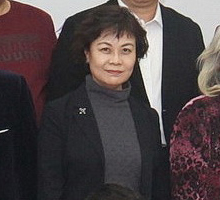 W
WTie Ning is a Chinese author based in Beijing, China. She has, since 2006, been the president of the China Writers Association and is a member of the 18th Central Committee of the Communist Party of China. Her works include short stories, "Ah, Xiangxue", The Red Shirt Without Buttons, "June's Big Topic", Wheat Straw Stack, Cotton Stack, "The Village Road Takes Me Home", Rose Door, "How Long is Forever" and Da Yu Nü.
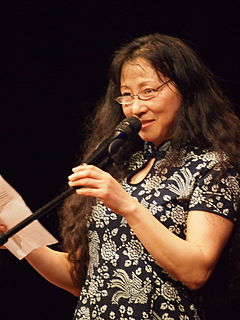 W
WWang Ping is a Chinese-American professor, poet, writer, photographer, performance and multimedia artist. Her publications have been translated into multiple languages and include poetry, short stories, novels, cultural studies, and children's stories. Her multimedia exhibitions address global themes of industrialization, the environment, interdependency, and the people.
 W
WYun Wang is a poet and cosmologist. She is originally from Gaoping, a small town near Zunyi, in Guizhou Province, China.
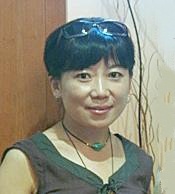 W
WTsering Woeser is a Tibetan writer, activist, blogger, poet and essayist.
 W
WJennifer Wong is a writer and poet from Hong Kong.
 W
WWu Zhao, commonly known as Wu Zetian, alternatively Wu Hou, and during the later Tang dynasty as Tian Hou, was the de facto ruler of China, first through her husband the Emperor Gaozong and then through her sons the Emperors Zhongzong and Ruizong, from 665 to 690. She subsequently became empress regnant of the Zhou dynasty (周) of China, ruling from 690 to 705. She is notable for being the only female monarch in the history of China.
 W
WXi Xi/Hsi Hsi is the pseudonym of the Chinese author and poet Zhang Yan. She was born in China and came to Hong Kong at the age of twelve. She was a teacher and now a Hong Kong-based writer. Her works are also popular in Taiwan and mainland China. She has become rather well known to Hong Kong secondary school students, not only due to her other works, but in particular "Shops" (店鋪), one of her essays which was adopted as reading material for the Chinese Language paper of Hong Kong Certificate of Education Examination (HKCEE) by the then-Hong Kong Examinations Authority. In 2019, Xi Xi was the recipient of the Newman Prize for Chinese Literature.
 W
WXiao Hong or Hsiao Hung (1 June 1911 – 22 January 1942) was a Chinese writer. Her ruming was Zhang Ronghua (張榮華) Her xueming was Zhang Xiuhuan(張秀環),name Zhang Naiying (張廼瑩) was changed by her grandfather; she also used the pen name Qiao Yin and Lingling.
 W
WJenny Xie is an American poet and teacher. She is the author of Eye Level, winner of the 2017 Walt Whitman award of the Academy of American Poets and a finalist of the National Book Award in 2017.
 W
WXu Pei is a Chinese-born German poet, writer, and human rights activist. Born in Sichuan province, she left China in 1988 and studied in Germany. Xu became a German citizen in 2004, and lives in Cologne, Germany.
 W
WXue Tao, courtesy name Hongdu (洪度/宏度) was a Chinese poet and courtesan of the Tang dynasty. She was one of the most famous women poets of Tang poetry, along with Yu Xuanji and Li Ye.
 W
WFlorence Chia-ying Yeh, also known as Ye Jiaying, Jialing, and by her married name Chia-ying Yeh Chao, is a Chinese-born Canadian poet and sinologist. She was a scholar of classical Chinese poetry. She taught for twenty years at the University of British Columbia (UBC), and has been Professor Emerita since her retirement in 1989. She is a Fellow of the Royal Society of Canada. After retiring from UBC, she has been teaching at Nankai University in Tianjin where she is the founding Director of the Institute of Chinese Classical Culture.
 W
WYu Xuanji, courtesy names Youwei and Huilan, was a Chinese poet and courtesan of the late Tang dynasty, from Chang'an. She was one of the most famous women poets of Tang, along with Xue Tao, her fellow courtesan.
 W
WYun Zhu or Wanglan Yun Zhu aka Adept of the Lotus Lake was a Qing dynasty poet, painter, anthologist and moralist. She gathered together thousands of poems written by hundreds of women.
 W
WZhuo Wenjun was a Chinese poet of the Western Han dynasty. As a young widow, she eloped with the poet Sima Xiangru. The poem Baitou Yin which complains at the inconstancy of male love, is attributed to her.